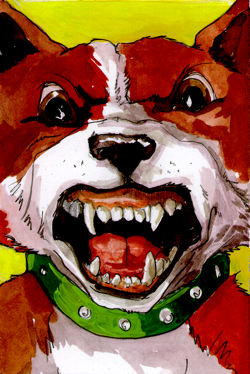The Bite Scale

Click here to download Dr. Dunbar's Bite Scale
Dog aggression is such a difficult subject to speak objectively about. People are always emotional when they talk about their dogs, but never more so than when they talk about issues with reactivity or aggression, whether it's a problem of fighting with other dogs or biting people.
When a dog "attacks" or acts aggressively towards a person, it can be hard to separate the scariness of the experience from how dangerous or damaging it actually was.
The size and the breed of a dog has a huge effect on people's perception of aggressive behavior. Little dogs can get away with the sort of behavior that would quickly get a larger dog reported to animal control. Breeds which have a reputation for being dangerous have very little room for error when it comes to temperament and behavior towards other people.
Even behaviors that are entirely friendly can be perceived as aggressive when performed by a breed with a bad reputation, or when the target is a child or someone who is afraid of dogs. The same event could easily be described as "a ferocious, terrifying attack" by one person, and as "just a little reactivity / roughhousing" by another.
So the question is, how do we objectively measure the severity of dog biting problems? How do we determine which dogs are actually dangerous?
Because dogs can be dangerous. Any dog may potentially bite, the real question is whether they have developed reliable bite inhibition. And any dog that has not developed bite inhibition is capable of inflicting serious harm in the blink of an eye, even little dogs.
Dr. Ian Dunbar's Bite Scale allows us to get an objective assessment of how dangerous a dog actually is. It allows us to determine the severity of a dog's bite based on an impartial evaluation of the amount of injury caused. The biting incident is then assigned to one of 6 levels. This allows us to put the situation into context and develop a reasonable prognosis about how much time, skill and risk could be expected in the rehabilitation of this dog.
The good news is that when used properly, the Bite Scale almost always indicates that the problem is not very dangerous and easily resolved with a little training.
Almost all "dog bites" are Level 1 or 2. The vast majority are Level 1, which is to say the dog snapped or lunged but didn't actually touch their teeth to anyone's skin. Many more "bites" are incidents where the dog's teeth touched, but did not puncture skin.
These dogs are actually quite safe and easily rehabilitated. These dogs need training right away, but if you act now these problems can be resolved with minimal risk. In some ways, these events are re-assuring in that the dog was pushed to the point of performing an aggressive reaction, but they inhibited their response in such a way as to not cause injury when they easily could have.
Of course, if you don't do anything this situation will certainly get worse, so Level 1 or 2 bites are not to be ignored. They are a clear warning sign that rehabilitative classical conditioning and hand-feeding is desperately needed immediately.
A very small minority of bites are Level 3 bite or higher. At this point the dog is puncturing skin and so we know the dog's bite inhibition is not reliable. This is a dog that is capable of causing serious harm. You need help from a professional dog trainer, and you need it immediately. Furthermore, it is your responsibility to manage this dog in such a way that they don't have the cause or opportunity to bite again.
A dog that causes this level of injury is a dangerous dog, regardless of their overall temperament. This could be the friendliest dog in the world, but we now know that their bite inhibition is not reliable and if an aggressive reaction is provoked, this dog could cause serious harm.
Click here to download Dr. Dunbar's Bite Scale
Want to learn more about dog aggression?
Join the Top Dog Academy to get access to videos, worksheets, podcasts, and more about dog training, dog aggression, reactivity, biting and fighting. When you join the Top Dog Academy you also get access to personalized email support. Use this link to get your first month for free.




